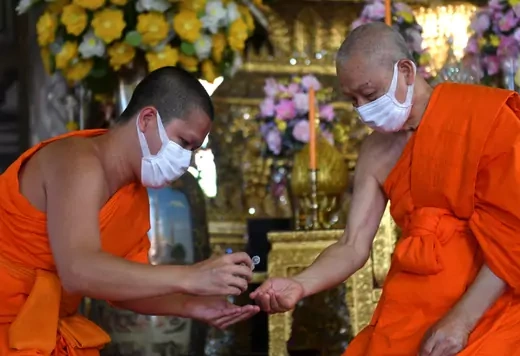How Are Major Religions Responding to the Coronavirus?
Many of the world’s faithful have altered long-standing religious practices to avoid spreading the new coronavirus.
By experts and staff
- Published
By
- Kali RobinsonSenior Writer/Copy Editor, Middle East
The religious practices of hundreds of millions of people are undergoing profound changes in response to the COVID-19 pandemic caused by a new coronavirus. The crisis has prompted many religious leaders to appeal to their followers to not only take safety precautions but also to embrace their spirituality to help confront the health, social, and economic challenges ahead.
How has the pandemic disrupted religious observances?

In some cases, religious gatherings have proven to be hotbeds for outbreaks. Half of South Korea’s cases can be traced back to a meeting of the Shincheonji Church of Jesus, a secretive doomsday group many Korean Christians consider to be a cult.* In Malaysia’s capital, Kuala Lumpur, several hundred Muslims who attended a mosque service contracted the virus, and in Washington, DC, a rector tested positive for the virus after performing communion at an Episcopalian church with more than five hundred congregants, all of whom were asked to self-quarantine for two weeks.
Many religious authorities are closing places of worship or limiting public gatherings. In an extraordinary gesture in February, Saudi Arabia banned foreign arrivals and halted visits to Mecca and Medina for umrah, a religious pilgrimage that Muslims can undertake at any time of year. Riyadh also briefly shuttered the Great Mosque in Mecca and the Prophet’s Mosque in Medina for disinfection. Many mosques have canceled Friday services, and calls to prayer in countries such as Kuwait and Malaysia have been altered to tell people to pray from home. Buddhist New Year celebrations, which often bring thousands of people together for public water fights and other events, have been canceled across South Asia.

Not everyone has embraced the restrictions. Despite a lockdown in Italy, the Diocese of Rome pushed back against an order to close all churches after Pope Francis warned of overreaction, though hundreds of churches did close. In Iran, hard-line Shiite Muslims stormed shrines that were closed due to the outbreak, while in India thousands of Hindus attended Holi festivities—many of them wearing surgical masks—despite Prime Minister Narendra Modi’s suggestion to avoid public gatherings.
Expressions of faith in some religious services emphasize close contact, such as hand-holding and sharing communion in Christian churches and touching or kissing religious objects at synagogues. Such practices are now being avoided in many religious spaces. At the same time, some religious orders have embraced technological solutions. The Roman Catholic Church, for instance, has begun livestreaming the Pope’s daily mass and Sunday sermon, and some parishes are offering drive-through confessions. A livestream of a service at the National Cathedral in Washington, DC, drew more than twenty-five thousand viewers earlier this month.
What messages are religious leaders sending?
Religious leaders regularly offer prayers and words of support to their communities; they have doubled down on those messages in recent weeks to ease worries over the virus. The Pope asked his followers to pray for those keeping public services running in Rome. Iraq’s senior Shiite cleric, Ayatollah Ali al-Sistani, said that medical staff are as important as those who defend their national borders and encouraged his followers to pray for caregivers. The Conference of European Rabbis advised synagogues on how to respond to the outbreak and urged people not to panic.
Many religious groups continue to provide charity services, including donating medical equipment to undersupplied communities, and leaders have expressed concern for particularly vulnerable groups. Catholic charities in Italy are still running soup kitchens for the poor, albeit with modifications to prevent the virus’s spread, and Jewish organizations in the state of California are collecting donations for low-income families, refugees, and isolated senior citizens.
How might upcoming celebrations be affected?
It is possible that this year’s Hajj pilgrimage, scheduled for July 28–August 2, will be canceled. While such a decision would disappoint the roughly three million Muslims who planned to make the trip this year, it isn’t without precedent. The Hajj has been suspended about forty times since the first pilgrimage in 629 CE, including for cholera outbreaks and plagues. At the Holy See, Holy Week celebrations such as the Palm Sunday mass and Good Friday procession will be held without the public for what might be the first time in modern history, though they could be livestreamed as daily masses have been.

Easter, Passover, and Ramadan, which occur within weeks of each other in April, will face major disruptions due to social distancing policies. For example, pilgrims hoping to visit the Christian, Jewish, and Islamic holy sites in Jerusalem should be prepared to undergo the two weeks of quarantine Israel requires for anyone entering the country, as travel restrictions will likely still be in place. During Ramadan, a time when able-bodied Muslims fast, it is likely that communal iftar meals will be canceled.
* Editor’s note: A previous version of this brief referred to the group as a Christian denomination. Religious scholars and mainstream Christians consider it a heretical cult.